Begin typing your search above and press return to search.
Featured
Should Indian athletes raise their voice on matters of social justice?
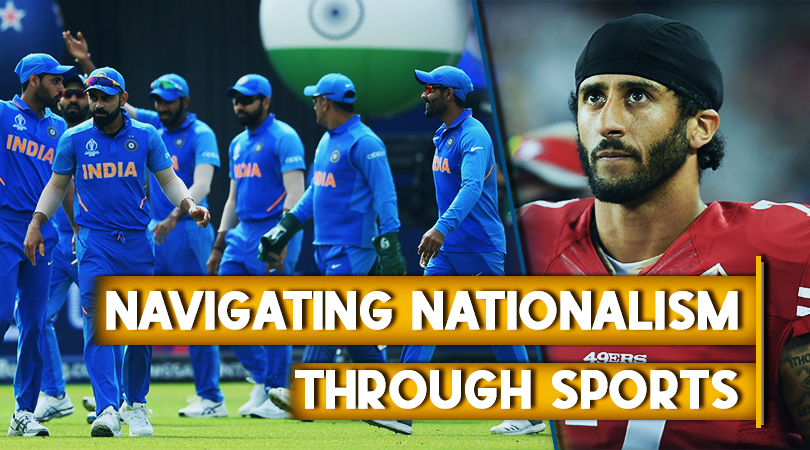
How can you differentiate between benign pride and nationalism? Is the essence of a nation embedded in sports? Social media and newsrooms were inflated with debates when recently Indian cricket team donned military-style camouflage caps in an ODI match against Australia in Ranchi. Similar kind of questions was in the discourse when M.S. Dhoni run into a controversy with the ICC for having a regimental insignia of Indian army on his wicketkeeping gloves. Along with that, we saw how the BCCI wanted ICC to remove Pakistan from the cricket world cup 2019, for harbouring terrorists. We witnessed India’s nationalist outrage voiced against Pakistan. In 2016, a similar outrage was noticed when Colin Kaepernick refused to stand during the national anthem in the US. The latest discourse of nationalism and patriotism has brought a lot of questions to the fore, and historian Mukul Kesavan delved deep into the matter, citing instances that had impacted sports at the biggest of the platforms. 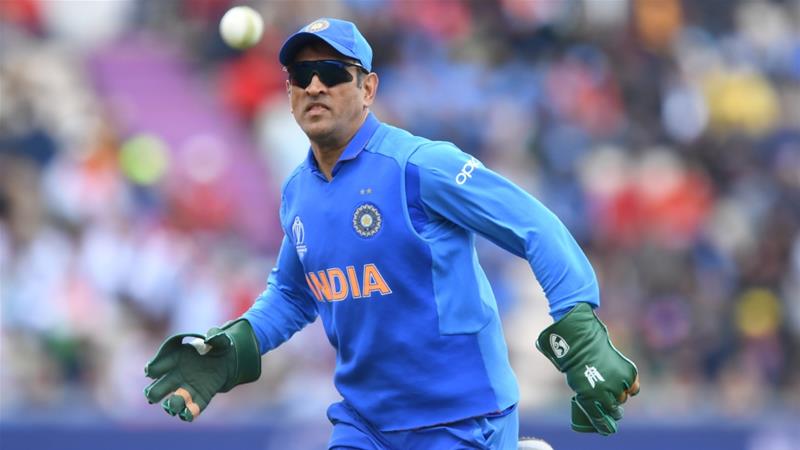 M. S. Dhoni donned the Indian Army regimental insignia on his gloves during the ICC Cricket World Cup Controversies akin to these were not common in Indian cricket context even five years ago. In his address at the Sports & Law Policy Symposium 2019, Mukul Kesavan shaped his discussion on the topic of ‘navigating nationalism and patriotism through sports’. He tried to dissect the issue from the perspective of history and through the point of view of an ardent sports lover. Quoting George Orwell’s famous statement “sport is war minus the shooting” that came out on The Tribune in 1936, Kesavan reflected upon the staggering comparison between sports and war.
M. S. Dhoni donned the Indian Army regimental insignia on his gloves during the ICC Cricket World Cup Controversies akin to these were not common in Indian cricket context even five years ago. In his address at the Sports & Law Policy Symposium 2019, Mukul Kesavan shaped his discussion on the topic of ‘navigating nationalism and patriotism through sports’. He tried to dissect the issue from the perspective of history and through the point of view of an ardent sports lover. Quoting George Orwell’s famous statement “sport is war minus the shooting” that came out on The Tribune in 1936, Kesavan reflected upon the staggering comparison between sports and war. 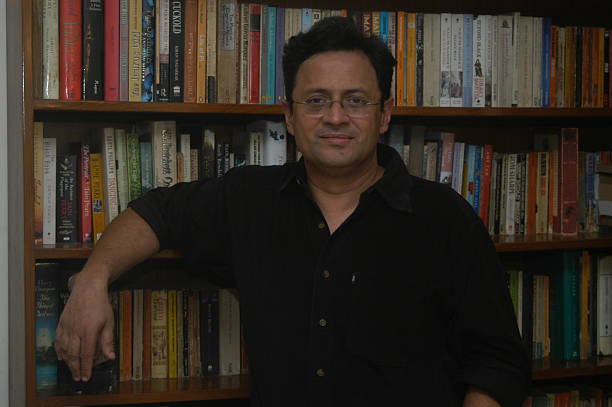 Mukul Kesavan, historian and novelist He delved deep into how a nation can be separated from sports by drawing examples of disciplines like tennis or the European club football, where wearing national colours comes as rare occasions of entertainment. “A person can consume sports like tennis, where individual excellence comes into play, or in that case, if you consider football, where leagues based on clubs and franchises have kind of displaced national sentiment of sports. As a fan, it could be delightful to watch a Federer or Nadal or even owing a tribal loyalty to a particular football club like Arsenal that has nothing to do with national solidarity. These remind us that a nation doesn’t have its monopoly on the way a sport is shaped,” said Kesavan.
Mukul Kesavan, historian and novelist He delved deep into how a nation can be separated from sports by drawing examples of disciplines like tennis or the European club football, where wearing national colours comes as rare occasions of entertainment. “A person can consume sports like tennis, where individual excellence comes into play, or in that case, if you consider football, where leagues based on clubs and franchises have kind of displaced national sentiment of sports. As a fan, it could be delightful to watch a Federer or Nadal or even owing a tribal loyalty to a particular football club like Arsenal that has nothing to do with national solidarity. These remind us that a nation doesn’t have its monopoly on the way a sport is shaped,” said Kesavan. 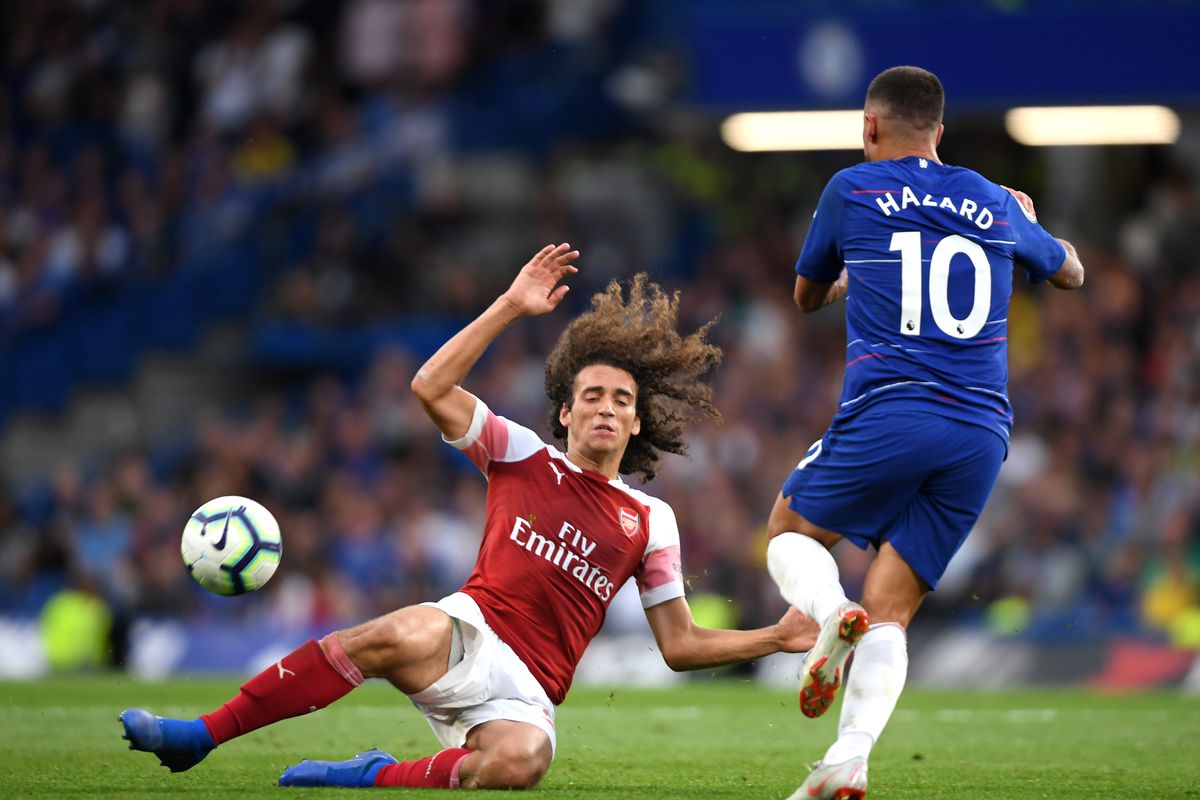 Premier League rivalry in England between Arsenal and Chelsea football clubs British historian Eric Hobsbawm had said “What has made sport so uniquely effective as a medium for inculcating national feelings, at all events for males, is the ease with which even the least political or public individuals can identify with the nation as symbolized by young persons excelling at what practically every man wants... to be good at. The imagined community of millions seems more real as a team of eleven named people.” Drawing attention to Hobsbawm’s paragraph, Kesavan mentioned that Hobsbawm had two major points to make. One was, sports is the best way to socialising people into nationalism. Also, secondly, this identification with the nation via sport was historically gender biased, which is to say sports induced nationalism has been historically an all-male communion. He moved on to discussing the stories of sportsmen who refused to give their nations its due From Muhammad Ali’s dissent to join the US army during Vietnam War, to the notable stance taken by American sprinters Tommie Smith and John Carlos who made the Black Power salute on the medal podium after placing 1st and 3rd in the 200 metres sprint in1968 Olympics. The duo, who were once deemed as Nazis in America, were later rehabilitated and statues were raised to honour them. More recently, we witnessed how in 2016, Colin Kaepernick, courted controversy when the African American quarterback in the National Football League, didn’t stand up for the American national anthem and chose to kneel in protest against the violence suffered by African Americans in the US. Kesavan drew these examples to draw a reference to the current scenario of India.
Premier League rivalry in England between Arsenal and Chelsea football clubs British historian Eric Hobsbawm had said “What has made sport so uniquely effective as a medium for inculcating national feelings, at all events for males, is the ease with which even the least political or public individuals can identify with the nation as symbolized by young persons excelling at what practically every man wants... to be good at. The imagined community of millions seems more real as a team of eleven named people.” Drawing attention to Hobsbawm’s paragraph, Kesavan mentioned that Hobsbawm had two major points to make. One was, sports is the best way to socialising people into nationalism. Also, secondly, this identification with the nation via sport was historically gender biased, which is to say sports induced nationalism has been historically an all-male communion. He moved on to discussing the stories of sportsmen who refused to give their nations its due From Muhammad Ali’s dissent to join the US army during Vietnam War, to the notable stance taken by American sprinters Tommie Smith and John Carlos who made the Black Power salute on the medal podium after placing 1st and 3rd in the 200 metres sprint in1968 Olympics. The duo, who were once deemed as Nazis in America, were later rehabilitated and statues were raised to honour them. More recently, we witnessed how in 2016, Colin Kaepernick, courted controversy when the African American quarterback in the National Football League, didn’t stand up for the American national anthem and chose to kneel in protest against the violence suffered by African Americans in the US. Kesavan drew these examples to draw a reference to the current scenario of India. 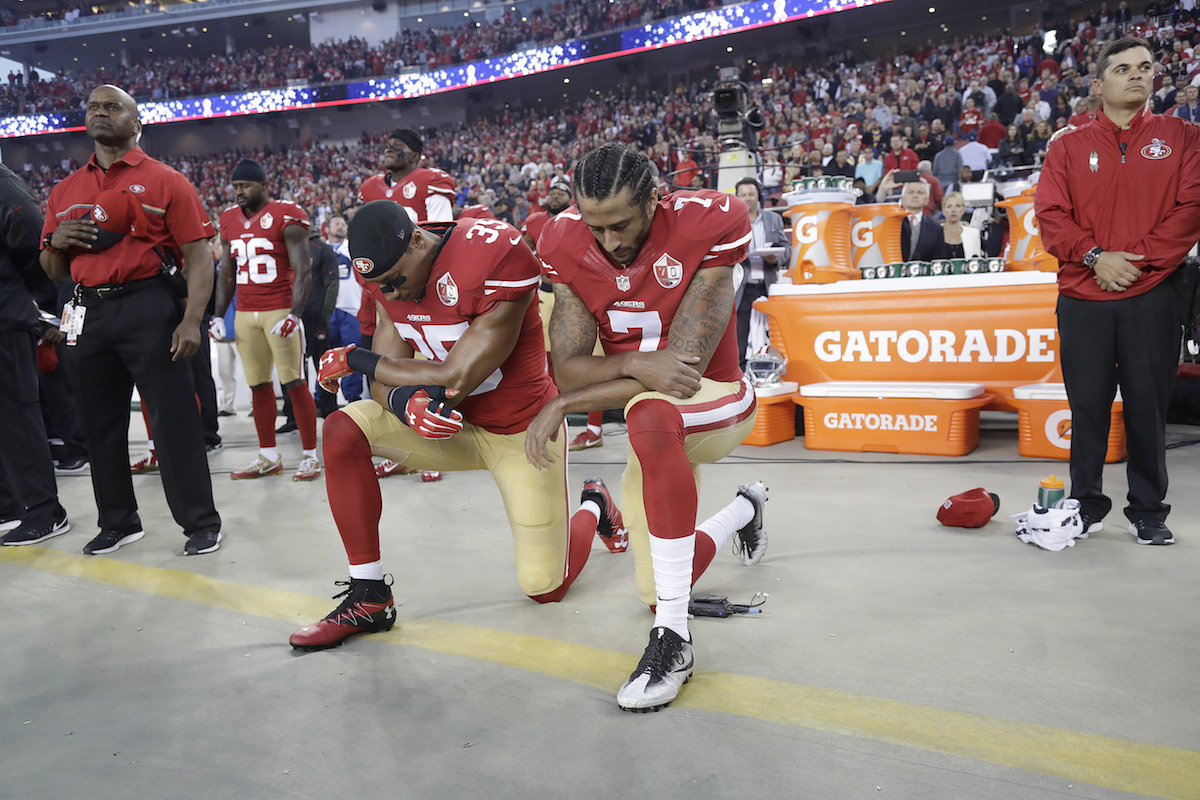 San Francisco 49ers safety Eric Reid (35) and quarterback Colin Kaepernick (7) kneel during the national anthem before an NFL football game
San Francisco 49ers safety Eric Reid (35) and quarterback Colin Kaepernick (7) kneel during the national anthem before an NFL football game 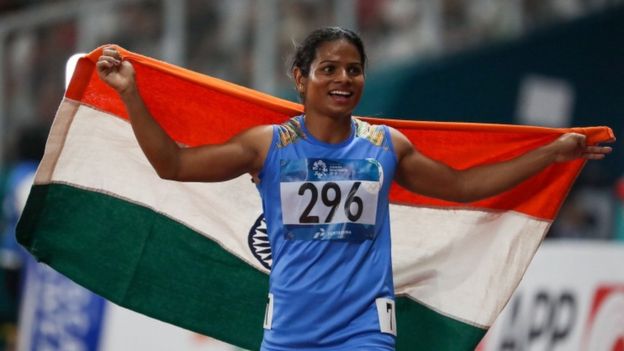 Dutee Chand American female football star Megan Rapinoe, who won the golden boot award at this year's FIFA World Cup and also won the Ballon d'Or, has been vocal about the wage gap between the sexes in football, and also against racism, sexism and homophobia. Recently, she called for Cristiano Ronaldo, Lionel Messi and Zlatan Ibrahimovic to support her in her fight against injustice. One can argue, that growing up in the US, Megan Rapinoe has been privileged with the social awareness and education which Cristiano and Messi haven't. They went into football from an early age and that's a they dedicated themselves to. Expecting awareness of such sensitivity that is given precedence only recently even in first world countries from them is too much of an expectation. In India, we have barely seen athletes coming in voice their thoughts on social justice. Mostly, they resort to promotion of the government initiatives and at times, they do it without having a strong understanding of the problems. For instance, during Diwali, boxer Mary Kom, shuttlers PV Sindhu and Saina Nehwal and paddler Manika Batra were among the sports personalities who took to Twitter to voice support for Prime Minister Narendra Modi's Bharat Laxmi initiative, which aims at empowering the women of the country. Sharing Union Minister for Youth Affairs and Sports Kiren Rijiju’s Twitter post, which also has a video lauding their achievements, the female sportspersons wrote the same message. In September, Prime Minister Narendra Modi had called for a campaign to honour daughters who have made a mark with their achievements in various fields for public good. "Daughters are considered as Lakshmi in our culture. Can't we felicitate daughters in our villages and cities by holding public programmes?" Modi had suggested in his monthly Mann ki Baat radio address. The atheletes were heavily criticised for sharing identical pots: https://twitter.com/free_thinker/status/1188092809422598145?s=20 According to Thomson Reuters Foundation survey in 2018, India was declared the world’s most dangerous country for women due to the high risk of sexual violence and being forced into slave labour. Afghanistan and Syria ranked second and third of 548 experts on women’s issues, followed by Somalia and Saudi Arabia. There was also a collective outrage last week on social media to punish the four people who were accused of brutally raping Hyderabad girl Priyanka Reddy and killing her by setting her body on fire. While India had wanted justice for her taking severe measures against the four accused, the event took a different turn when the police killed the four of them in an encounter, without any interference of judiciary and trial. Though the law didn't take its course, athletes like Bajrang Punia, Saina Nehwal, P V Sindhu congratulated the police for taking the drastic step, which echoed the populist sentiment. https://twitter.com/NSaina/status/1202806523837087744?s=20 Indian athletes are not very vocal when it comes to condemning the social evils around us. Kesavan’s speech, however, stirs a debate whether an athlete, going beyond his/her line of duty, should be chastising the demons plaguing the nation?
Dutee Chand American female football star Megan Rapinoe, who won the golden boot award at this year's FIFA World Cup and also won the Ballon d'Or, has been vocal about the wage gap between the sexes in football, and also against racism, sexism and homophobia. Recently, she called for Cristiano Ronaldo, Lionel Messi and Zlatan Ibrahimovic to support her in her fight against injustice. One can argue, that growing up in the US, Megan Rapinoe has been privileged with the social awareness and education which Cristiano and Messi haven't. They went into football from an early age and that's a they dedicated themselves to. Expecting awareness of such sensitivity that is given precedence only recently even in first world countries from them is too much of an expectation. In India, we have barely seen athletes coming in voice their thoughts on social justice. Mostly, they resort to promotion of the government initiatives and at times, they do it without having a strong understanding of the problems. For instance, during Diwali, boxer Mary Kom, shuttlers PV Sindhu and Saina Nehwal and paddler Manika Batra were among the sports personalities who took to Twitter to voice support for Prime Minister Narendra Modi's Bharat Laxmi initiative, which aims at empowering the women of the country. Sharing Union Minister for Youth Affairs and Sports Kiren Rijiju’s Twitter post, which also has a video lauding their achievements, the female sportspersons wrote the same message. In September, Prime Minister Narendra Modi had called for a campaign to honour daughters who have made a mark with their achievements in various fields for public good. "Daughters are considered as Lakshmi in our culture. Can't we felicitate daughters in our villages and cities by holding public programmes?" Modi had suggested in his monthly Mann ki Baat radio address. The atheletes were heavily criticised for sharing identical pots: https://twitter.com/free_thinker/status/1188092809422598145?s=20 According to Thomson Reuters Foundation survey in 2018, India was declared the world’s most dangerous country for women due to the high risk of sexual violence and being forced into slave labour. Afghanistan and Syria ranked second and third of 548 experts on women’s issues, followed by Somalia and Saudi Arabia. There was also a collective outrage last week on social media to punish the four people who were accused of brutally raping Hyderabad girl Priyanka Reddy and killing her by setting her body on fire. While India had wanted justice for her taking severe measures against the four accused, the event took a different turn when the police killed the four of them in an encounter, without any interference of judiciary and trial. Though the law didn't take its course, athletes like Bajrang Punia, Saina Nehwal, P V Sindhu congratulated the police for taking the drastic step, which echoed the populist sentiment. https://twitter.com/NSaina/status/1202806523837087744?s=20 Indian athletes are not very vocal when it comes to condemning the social evils around us. Kesavan’s speech, however, stirs a debate whether an athlete, going beyond his/her line of duty, should be chastising the demons plaguing the nation?
 M. S. Dhoni donned the Indian Army regimental insignia on his gloves during the ICC Cricket World Cup Controversies akin to these were not common in Indian cricket context even five years ago. In his address at the Sports & Law Policy Symposium 2019, Mukul Kesavan shaped his discussion on the topic of ‘navigating nationalism and patriotism through sports’. He tried to dissect the issue from the perspective of history and through the point of view of an ardent sports lover. Quoting George Orwell’s famous statement “sport is war minus the shooting” that came out on The Tribune in 1936, Kesavan reflected upon the staggering comparison between sports and war.
M. S. Dhoni donned the Indian Army regimental insignia on his gloves during the ICC Cricket World Cup Controversies akin to these were not common in Indian cricket context even five years ago. In his address at the Sports & Law Policy Symposium 2019, Mukul Kesavan shaped his discussion on the topic of ‘navigating nationalism and patriotism through sports’. He tried to dissect the issue from the perspective of history and through the point of view of an ardent sports lover. Quoting George Orwell’s famous statement “sport is war minus the shooting” that came out on The Tribune in 1936, Kesavan reflected upon the staggering comparison between sports and war. “War is a serious business, but sport is not something of the same way. Cricket is, of course, serious business in the matter of money, but not as same as dying for country,” Kesavan asserted at the Symposium.
 Mukul Kesavan, historian and novelist He delved deep into how a nation can be separated from sports by drawing examples of disciplines like tennis or the European club football, where wearing national colours comes as rare occasions of entertainment. “A person can consume sports like tennis, where individual excellence comes into play, or in that case, if you consider football, where leagues based on clubs and franchises have kind of displaced national sentiment of sports. As a fan, it could be delightful to watch a Federer or Nadal or even owing a tribal loyalty to a particular football club like Arsenal that has nothing to do with national solidarity. These remind us that a nation doesn’t have its monopoly on the way a sport is shaped,” said Kesavan.
Mukul Kesavan, historian and novelist He delved deep into how a nation can be separated from sports by drawing examples of disciplines like tennis or the European club football, where wearing national colours comes as rare occasions of entertainment. “A person can consume sports like tennis, where individual excellence comes into play, or in that case, if you consider football, where leagues based on clubs and franchises have kind of displaced national sentiment of sports. As a fan, it could be delightful to watch a Federer or Nadal or even owing a tribal loyalty to a particular football club like Arsenal that has nothing to do with national solidarity. These remind us that a nation doesn’t have its monopoly on the way a sport is shaped,” said Kesavan.  Premier League rivalry in England between Arsenal and Chelsea football clubs British historian Eric Hobsbawm had said “What has made sport so uniquely effective as a medium for inculcating national feelings, at all events for males, is the ease with which even the least political or public individuals can identify with the nation as symbolized by young persons excelling at what practically every man wants... to be good at. The imagined community of millions seems more real as a team of eleven named people.” Drawing attention to Hobsbawm’s paragraph, Kesavan mentioned that Hobsbawm had two major points to make. One was, sports is the best way to socialising people into nationalism. Also, secondly, this identification with the nation via sport was historically gender biased, which is to say sports induced nationalism has been historically an all-male communion. He moved on to discussing the stories of sportsmen who refused to give their nations its due From Muhammad Ali’s dissent to join the US army during Vietnam War, to the notable stance taken by American sprinters Tommie Smith and John Carlos who made the Black Power salute on the medal podium after placing 1st and 3rd in the 200 metres sprint in1968 Olympics. The duo, who were once deemed as Nazis in America, were later rehabilitated and statues were raised to honour them. More recently, we witnessed how in 2016, Colin Kaepernick, courted controversy when the African American quarterback in the National Football League, didn’t stand up for the American national anthem and chose to kneel in protest against the violence suffered by African Americans in the US. Kesavan drew these examples to draw a reference to the current scenario of India.
Premier League rivalry in England between Arsenal and Chelsea football clubs British historian Eric Hobsbawm had said “What has made sport so uniquely effective as a medium for inculcating national feelings, at all events for males, is the ease with which even the least political or public individuals can identify with the nation as symbolized by young persons excelling at what practically every man wants... to be good at. The imagined community of millions seems more real as a team of eleven named people.” Drawing attention to Hobsbawm’s paragraph, Kesavan mentioned that Hobsbawm had two major points to make. One was, sports is the best way to socialising people into nationalism. Also, secondly, this identification with the nation via sport was historically gender biased, which is to say sports induced nationalism has been historically an all-male communion. He moved on to discussing the stories of sportsmen who refused to give their nations its due From Muhammad Ali’s dissent to join the US army during Vietnam War, to the notable stance taken by American sprinters Tommie Smith and John Carlos who made the Black Power salute on the medal podium after placing 1st and 3rd in the 200 metres sprint in1968 Olympics. The duo, who were once deemed as Nazis in America, were later rehabilitated and statues were raised to honour them. More recently, we witnessed how in 2016, Colin Kaepernick, courted controversy when the African American quarterback in the National Football League, didn’t stand up for the American national anthem and chose to kneel in protest against the violence suffered by African Americans in the US. Kesavan drew these examples to draw a reference to the current scenario of India.  San Francisco 49ers safety Eric Reid (35) and quarterback Colin Kaepernick (7) kneel during the national anthem before an NFL football game
San Francisco 49ers safety Eric Reid (35) and quarterback Colin Kaepernick (7) kneel during the national anthem before an NFL football game “What if Smith and Carlos’s protest and Kaepernick’s refusal to stand for the national anthem were replicated by Indian protesters during a flag-raising or a performance of the Indian national anthem? What if an Indian woman athlete followed Kaepernick in refusing to stand for the national anthem in protest against the epidemic of sexual violence against women in India?"
He added, "In the context of unfolding mayhem in Unnao and the epidemic of sexual violence in the country, this is not inconceivable. What if a Dalit athlete were to do what Tommie Smith did to protest against manual scavengers dying in septic tanks or to mark the beating to death of Dalit cattle traders or leatherworkers for alleged cattle thieving? I suspect that the nation-state, being a jealous God, would not be happy, and its displeasure might be echoed and amplified by fans, administrators, the guardians of the nation-state, even newspaper readers.”
 Dutee Chand American female football star Megan Rapinoe, who won the golden boot award at this year's FIFA World Cup and also won the Ballon d'Or, has been vocal about the wage gap between the sexes in football, and also against racism, sexism and homophobia. Recently, she called for Cristiano Ronaldo, Lionel Messi and Zlatan Ibrahimovic to support her in her fight against injustice. One can argue, that growing up in the US, Megan Rapinoe has been privileged with the social awareness and education which Cristiano and Messi haven't. They went into football from an early age and that's a they dedicated themselves to. Expecting awareness of such sensitivity that is given precedence only recently even in first world countries from them is too much of an expectation. In India, we have barely seen athletes coming in voice their thoughts on social justice. Mostly, they resort to promotion of the government initiatives and at times, they do it without having a strong understanding of the problems. For instance, during Diwali, boxer Mary Kom, shuttlers PV Sindhu and Saina Nehwal and paddler Manika Batra were among the sports personalities who took to Twitter to voice support for Prime Minister Narendra Modi's Bharat Laxmi initiative, which aims at empowering the women of the country. Sharing Union Minister for Youth Affairs and Sports Kiren Rijiju’s Twitter post, which also has a video lauding their achievements, the female sportspersons wrote the same message. In September, Prime Minister Narendra Modi had called for a campaign to honour daughters who have made a mark with their achievements in various fields for public good. "Daughters are considered as Lakshmi in our culture. Can't we felicitate daughters in our villages and cities by holding public programmes?" Modi had suggested in his monthly Mann ki Baat radio address. The atheletes were heavily criticised for sharing identical pots: https://twitter.com/free_thinker/status/1188092809422598145?s=20 According to Thomson Reuters Foundation survey in 2018, India was declared the world’s most dangerous country for women due to the high risk of sexual violence and being forced into slave labour. Afghanistan and Syria ranked second and third of 548 experts on women’s issues, followed by Somalia and Saudi Arabia. There was also a collective outrage last week on social media to punish the four people who were accused of brutally raping Hyderabad girl Priyanka Reddy and killing her by setting her body on fire. While India had wanted justice for her taking severe measures against the four accused, the event took a different turn when the police killed the four of them in an encounter, without any interference of judiciary and trial. Though the law didn't take its course, athletes like Bajrang Punia, Saina Nehwal, P V Sindhu congratulated the police for taking the drastic step, which echoed the populist sentiment. https://twitter.com/NSaina/status/1202806523837087744?s=20 Indian athletes are not very vocal when it comes to condemning the social evils around us. Kesavan’s speech, however, stirs a debate whether an athlete, going beyond his/her line of duty, should be chastising the demons plaguing the nation?
Dutee Chand American female football star Megan Rapinoe, who won the golden boot award at this year's FIFA World Cup and also won the Ballon d'Or, has been vocal about the wage gap between the sexes in football, and also against racism, sexism and homophobia. Recently, she called for Cristiano Ronaldo, Lionel Messi and Zlatan Ibrahimovic to support her in her fight against injustice. One can argue, that growing up in the US, Megan Rapinoe has been privileged with the social awareness and education which Cristiano and Messi haven't. They went into football from an early age and that's a they dedicated themselves to. Expecting awareness of such sensitivity that is given precedence only recently even in first world countries from them is too much of an expectation. In India, we have barely seen athletes coming in voice their thoughts on social justice. Mostly, they resort to promotion of the government initiatives and at times, they do it without having a strong understanding of the problems. For instance, during Diwali, boxer Mary Kom, shuttlers PV Sindhu and Saina Nehwal and paddler Manika Batra were among the sports personalities who took to Twitter to voice support for Prime Minister Narendra Modi's Bharat Laxmi initiative, which aims at empowering the women of the country. Sharing Union Minister for Youth Affairs and Sports Kiren Rijiju’s Twitter post, which also has a video lauding their achievements, the female sportspersons wrote the same message. In September, Prime Minister Narendra Modi had called for a campaign to honour daughters who have made a mark with their achievements in various fields for public good. "Daughters are considered as Lakshmi in our culture. Can't we felicitate daughters in our villages and cities by holding public programmes?" Modi had suggested in his monthly Mann ki Baat radio address. The atheletes were heavily criticised for sharing identical pots: https://twitter.com/free_thinker/status/1188092809422598145?s=20 According to Thomson Reuters Foundation survey in 2018, India was declared the world’s most dangerous country for women due to the high risk of sexual violence and being forced into slave labour. Afghanistan and Syria ranked second and third of 548 experts on women’s issues, followed by Somalia and Saudi Arabia. There was also a collective outrage last week on social media to punish the four people who were accused of brutally raping Hyderabad girl Priyanka Reddy and killing her by setting her body on fire. While India had wanted justice for her taking severe measures against the four accused, the event took a different turn when the police killed the four of them in an encounter, without any interference of judiciary and trial. Though the law didn't take its course, athletes like Bajrang Punia, Saina Nehwal, P V Sindhu congratulated the police for taking the drastic step, which echoed the populist sentiment. https://twitter.com/NSaina/status/1202806523837087744?s=20 Indian athletes are not very vocal when it comes to condemning the social evils around us. Kesavan’s speech, however, stirs a debate whether an athlete, going beyond his/her line of duty, should be chastising the demons plaguing the nation? Next Story






